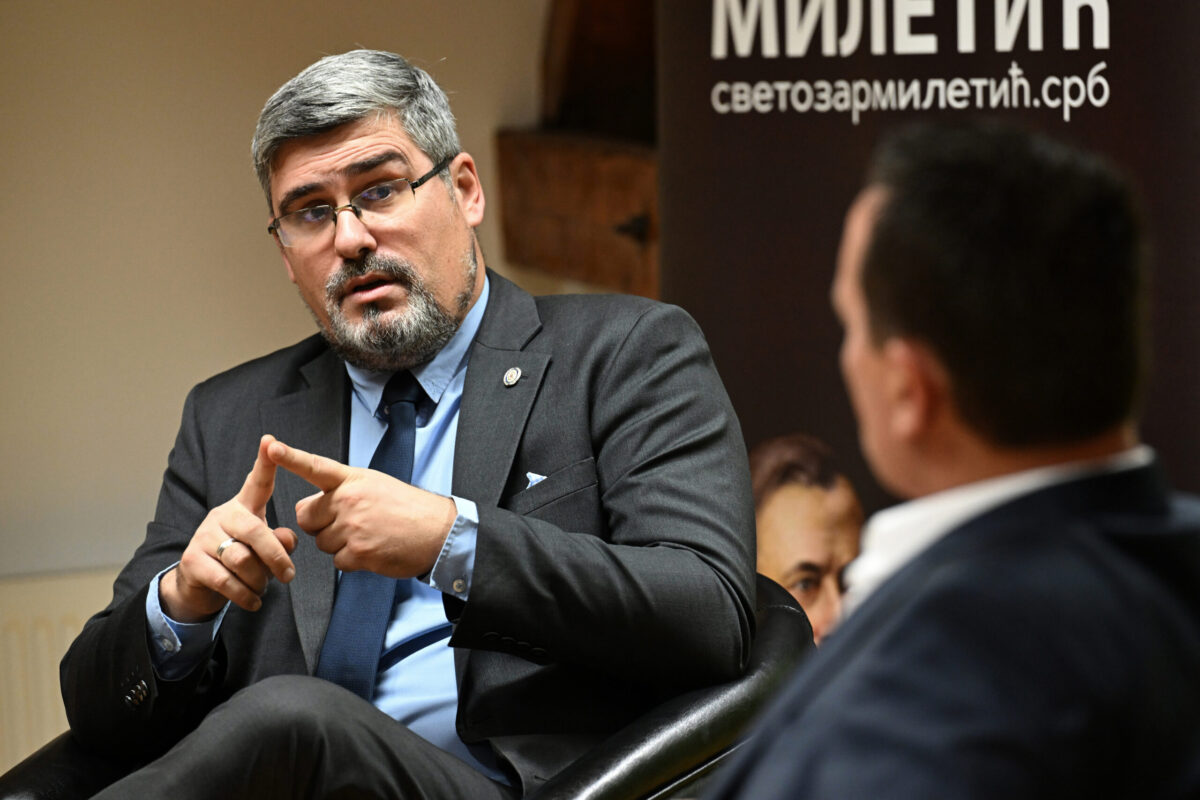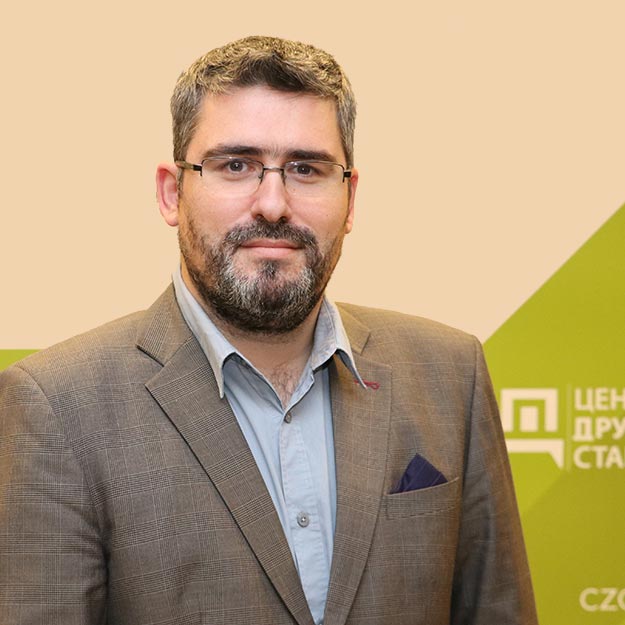The key measure of success for all of us will be to what extent we can slow down negative demographic trends

Your name isn’t particularly well-known in Serbia’s political scene despite your rich political biography. Is that because you’re not from Belgrade? How difficult is it to succeed in Serbia in any field if you’re not from the capital?
When it comes to advancing in the political world, as well as success in the business world more broadly, being born in Belgrade brings numerous advantages, especially when it comes to the initial steps in one’s career. Here, the institutions of state power are concentrated, as well as the headquarters of the largest companies, both public and private, the most influential media, and so on. The possibility of engagement and work in such places, without the high costs of accommodation or transportation, represents a significant initial advantage for young people from our capital compared to those with somewhat more distant residence. However, there is also another side to the coin. Belgrade reminds me of a big carousel that offers opportunities for dizzying ascents, often using various shortcuts, but also for steep descents. Those who build their careers elsewhere typically do so in a much more thorough manner, with more investment in their own education, acquiring the necessary knowledge and skills, which makes progress much slower but certainly more sustainable and enduring.
How would you briefly describe your political career?
Given that I’ve been actively involved in political life and work for a full 26 years, it’s not easy to summarize all the experiences in a few sentences, nor would it make much sense to simply list the party and public positions I’ve held. I became politically active at the young age of 16, driven by strong ideals, and that kind of motivation has never left me. I initially gained experience in political work at the local level in my hometown of Novi Sad, where I still live, and later enriched them with work in the City Assembly and City Council. However, parallel to that, I, along with a group of people with similar interests, developed a non-governmental organization that organized numerous forums and produced hundreds of informative and educational programs. Later, I launched my own authored program, which I hosted for a full five years on the First Channel of RTV Vojvodina. All of this was eventually recognized and valued, leading to the invitation to take on the role of State Secretary at the Ministry of Foreign Affairs in the Second government of Ana Brnabić. In the previous term, at the invitation of Miloš Vučević, I moved to an identical position in the Ministry of Defense. I consider the opportunity to lead the Ministry of Labor, Employment, Veterans, and Social Affairs in the new Government of Serbia a great honor, but I am also aware of the significant responsibility that comes with this position.
What has been your most challenging and demanding engagement so far, including journalism?
This may sound like a cliché, but I truly believe that every job comes with specific challenges that are difficult to compare. As a rule, the biggest challenge is always the one you are currently facing. However, looking back, I would say that I particularly considered my engagement in the Novi Sad City Assembly as a significant challenge. When I first sat in the council chambers at the age of 26, it was not easy to earn respect, equal treatment, and then one of the leading roles within that body, in an environment of much older and more experienced colleagues, both from the ruling party and the opposition. As for the feeling of responsibility, I consider my involvement in the leadership of the Ministry of Foreign Affairs, as well as the Ministry of Defense, to be a great and valuable experience. When you represent your country abroad, you must be aware at all times that your word binds the state, even during less formal encounters. This is especially true during bilateral and multilateral negotiations, and I still remember certain occasions when negotiations would stretch well into the night, as you cannot give up on any word, as it can have direct consequences for the people and the country you represent and love.
The greatest challenge is always the one you are currently facing
As the Minister for Labor, Employment, Veterans’ and Social Affairs of the Republic of Serbia, you will surely have your hands full. What are the top three issues in Serbia that you see as priorities for resolution from the position of executive power?
It is indeed difficult to narrow down to just three key tasks that I plan to tackle with the team of collaborators, considering the truly large and complex portfolio I have been given the opportunity to lead, as well as the need for interdepartmental solutions to some major issues. However, I would highlight the issue of demography, on which we will work diligently with colleagues from the Ministry for Family Care, the Ministry of Finance, and other departments. Alongside all the economic achievements we will accomplish during the mandate following the ‘Leap into the Future – Serbia 2027’ program, I believe the crucial measure of success for all of us will be our ability to slow down negative demographic trends, both in terms of at least a slight increase in the birth rate and in balancing the migration balance. Social policy measures, as well as those in the field of labor and employment, will be an important part of the extensive work ahead of us. Another prominent issue is undoubtedly population aging, which necessitates the development of various programs focused on active aging, as well as on the so-called ‘silver economy,’ which entails a system of production, distribution, and consumption of goods and services tailored to the needs of people in the third age. Finally, given that an important part of the department I lead involves preserving the traditions of liberation wars, I will pay great attention to the project of building a memorial center dedicated to the victims of genocide in the Independent State of Croatia, which will be constructed through the joint efforts of the Government of Serbia and the Government of the Republic of Srpska at two locations, in Donja Gradina and in Belgrade.

Why are citizens of Serbia massively emigrating abroad? Our country is becoming empty, and we no longer have anyone to heal us, drive us, fix our breakdowns, or build. The list of deficit occupations is growing larger and quite alarming. How to stop this trend?
There are numerous reasons for the emergence of negative migratory trends characteristic of the entire Eastern and Southeastern Europe, but it is always good to start with the economy and the standard of living of the population. The experiences of Central European countries, which joined the European Union in 2004, indicate that these negative trends were halted when they reached the level of earnings equivalent to the EU average. I believe that by implementing the ambitious yet achievable plan set by the Government, which envisages reaching an average salary of 1,400 euros in the next three years, we will move closer to that result. Already today, for every 100 people leaving Serbia, we have 80 who are coming to Serbia or returning. In terms of educational structure, the effect of the so-called ‘brain drain’ has been neutralized because more people with university degrees come to our country every year than leave it. However, when it comes to craftsmen and technicians of various professions, the negative migratory balance is still present.
Why is old age in Serbia so frightening and harsh? We see retirees in the West enjoying life, which is not at all luxurious. Why is old age not so carefree here?
The answer to this question largely lies in economic indicators, namely that average pensions still do not meet all the needs of our elderly, although they have been increased faster than ever in the last three decades, with periodic one-time assistance payments according to budgetary possibilities. However, we must also consider the circumstances of modern life that have led to the dissolution of multi-generational family communities and social support networks they entailed, as well as the constant trend of migration from rural areas to cities, which often leaves elderly households isolated in remote rural areas. These are trends that cannot be reversed, but what we can and must do is to express a higher level of social solidarity, which we will do through social policy measures in the coming period.
The effect of the so-called “brain drain” has been neutralized because more people with university degrees are coming to our country each year than leaving it
There’s talk of raising the retirement age again, even though our average life expectancy is getting shorter. According to official statistics, the average citizen of Serbia will pass away several years before reaching retirement. How do you comment on and justify such an idea?
I wouldn’t entirely agree with the statement contained in the question. Namely, life expectancy in Serbia is shorter, observed on the so-called short scale, as it is throughout Europe, and this is a direct effect of the coronavirus pandemic that we have all endured. Viewed on a longer scale, there is undoubtedly a constant trend of life expectancy extension in Serbia. As for raising the retirement age, there are no immediate plans for such a thing. However, it is a fact that this is happening in many European countries, due to demographic trends to which we are all equally exposed. If this issue comes up for discussion in Serbia at some point, it will certainly be carefully considered, both in terms of the necessary dialogue with social partners and in terms of a broader and more comprehensive public debate.